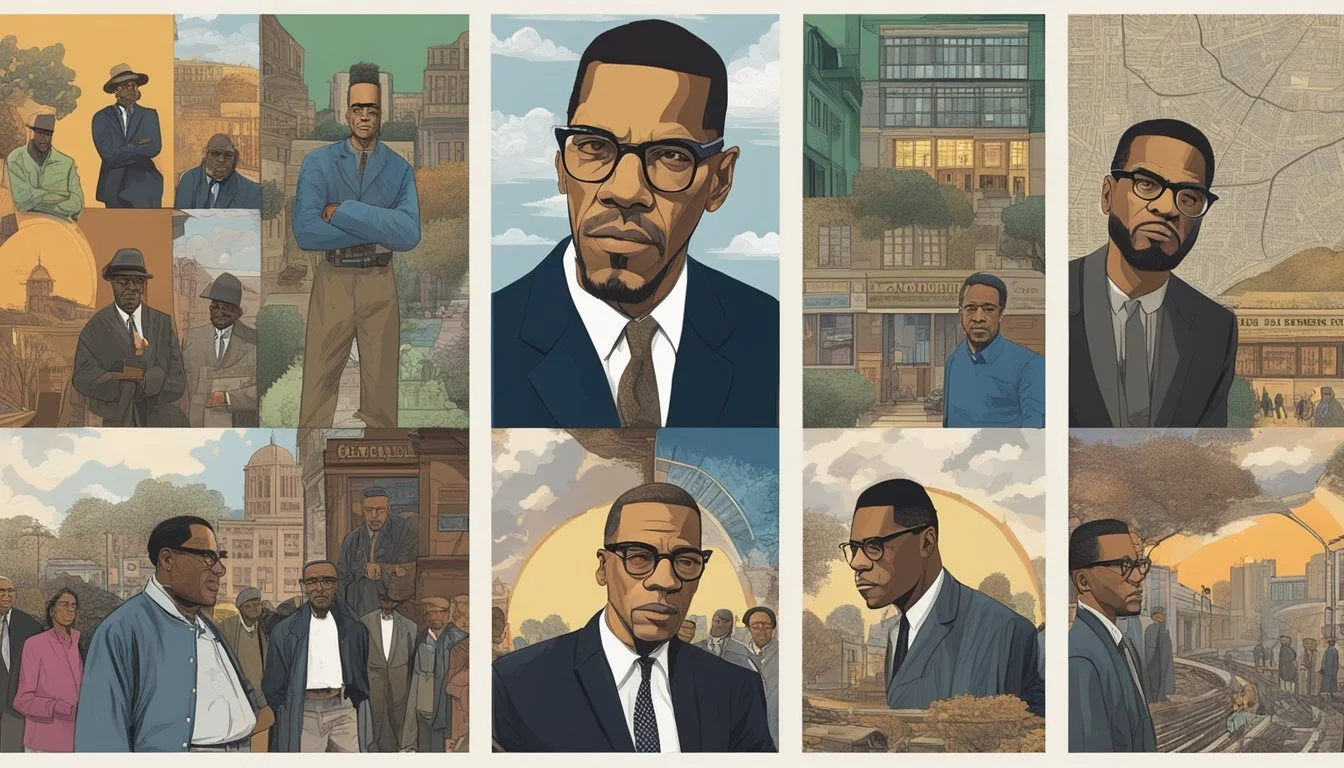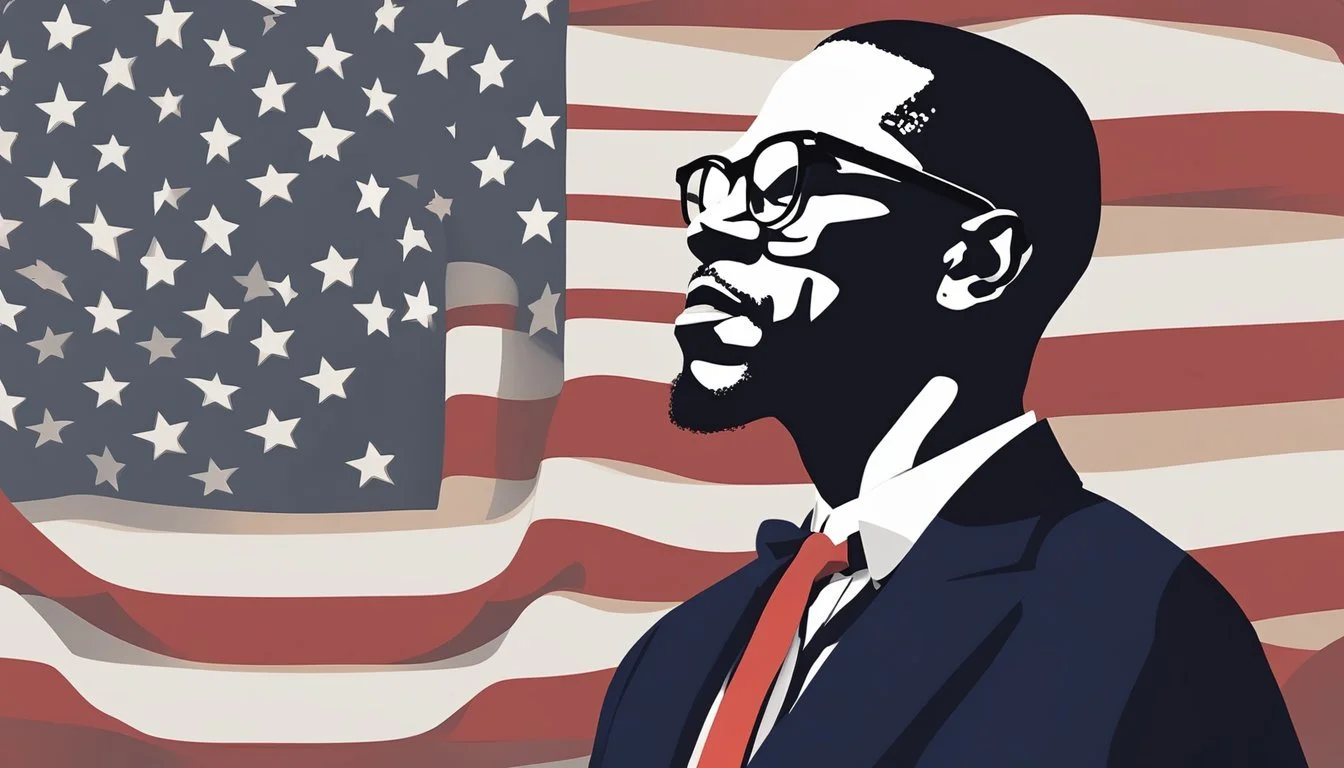6 Documentaries Exploring Malcolm X's Life and Legacy
Unveiling the Icon's Impact on Civil Rights
Malcolm X stands as a pivotal figure in American civil rights history, his life and legacy continuing to inspire and provoke discussion decades after his assassination. Documentaries offer a powerful medium to explore the complexities of his journey, from his early years to his emergence as a influential leader and thinker.
These films provide viewers with a nuanced understanding of Malcolm X's evolving philosophies, his impact on the civil rights movement, and his enduring relevance in contemporary society. By examining different aspects of his life through archival footage, interviews, and expert analysis, documentaries serve as valuable educational tools for those seeking to comprehend Malcolm X's multifaceted legacy.
1) 'Malcolm X: Make It Plain' (PBS Documentary)
'Malcolm X: Make It Plain' is a comprehensive PBS documentary that aired in 1994. Directed by Orlando Bagwell, the film offers an in-depth look at the life and legacy of Malcolm X.
The documentary features rare archival footage and interviews with people who knew Malcolm X personally. It traces his journey from his early years as Malcolm Little to his transformation into a powerful civil rights leader.
Narrated by Alfre Woodard, the film explores Malcolm's evolution of thought and his impact on the civil rights movement. It provides context for his controversial statements and examines the complexities of his character.
'Make It Plain' delves into Malcolm's relationship with the Nation of Islam and his eventual split from the organization. The documentary also covers his pilgrimage to Mecca and the changes in his philosophy that followed.
The film received critical acclaim for its thorough and nuanced portrayal of Malcolm X's life and ideas. It remains a valuable resource for those seeking to understand this influential figure in American history.
https://en.wikipedia.org/wiki/Malcolm_X:_Make_It_Plain
2) 'Malcolm X: Prince of Islam'
'Malcolm X: Prince of Islam' offers a unique perspective on the life of al-Hajj Malik Shabazz, widely known as Malcolm X. This documentary showcases previously unseen footage of the influential civil rights leader.
The film explores Malcolm X's journey from his early years in Michigan to his rise as a prominent figure in the Nation of Islam. It delves into his transformation and the impact of his Islamic faith on his activism.
Viewers gain insight into Malcolm X's strategies and beliefs, particularly his emphasis on Islam as a catalyst for societal change. The documentary highlights how his religious convictions shaped his approach to civil rights and social justice.
'Malcolm X: Prince of Islam' presents a comprehensive look at Malcolm X's role as both a religious and political leader. It examines his influence on the civil rights movement and his vision for Black empowerment through Islamic principles.
https://www.imdb.com/title/tt1867165/
3) 'The Life of Malcolm X' by Biography Channel
The Biography Channel's documentary "The Life of Malcolm X" offers a comprehensive look at the influential civil rights leader. This film chronicles Malcolm's journey from his early years to his rise as a prominent figure in the Nation of Islam.
The documentary explores Malcolm's transformation from a street hustler to a powerful orator and activist. It delves into his controversial speeches and his evolving views on racial equality and black empowerment.
Interviews with historians, contemporaries, and family members provide valuable insights into Malcolm's personal life and public persona. The film also examines the complex relationships Malcolm had with other civil rights leaders of his time.
Archival footage and photographs help bring Malcolm's story to life, showcasing key moments in his career and the tumultuous era in which he lived. The documentary addresses the circumstances surrounding Malcolm's assassination and his lasting impact on American society.
"The Life of Malcolm X" presents a balanced portrayal of its subject, acknowledging both his contributions to the civil rights movement and the controversies that surrounded him.
https://www.youtube.com/watch?v=sTvIWU2xM4c
4) 'Malcolm X' (Directed by Spike Lee)
Spike Lee's 1992 biographical drama "Malcolm X" stands as a landmark film in cinema history. This epic portrayal of the influential civil rights leader stars Denzel Washington in a powerhouse performance as Malcolm X.
The film chronicles Malcolm's life from his early days as a small-time criminal through his transformation into a prominent figure in the Nation of Islam. It culminates with his pilgrimage to Mecca and subsequent assassination in 1965.
Lee's direction blends narrative filmmaking with documentary-style elements, creating a rich tapestry of Malcolm X's life and times. The movie's scope is ambitious, covering over three hours of runtime to fully explore its subject's complex journey.
Washington's Oscar-nominated performance brings depth and nuance to Malcolm X's character. The supporting cast, including Angela Bassett as Betty Shabazz, further enhances the film's authenticity and emotional impact.
"Malcolm X" received critical acclaim for its bold storytelling and historical significance. It remains a powerful examination of race relations in America and a testament to Malcolm X's enduring legacy.
Wikipedia: Malcolm X (1992 film)
5) 'The Witness: From the Balcony of Room 306'
'The Witness: From the Balcony of Room 306' is a 2008 documentary short film directed by Adam Pertofsky. The film honors the 40th anniversary of Martin Luther King Jr.'s life and death.
The documentary centers on Reverend Samuel "Billy" Kyles, who stood beside Dr. King on the balcony of the Lorraine Motel in Memphis, Tennessee on April 4, 1968. Kyles witnessed King's assassination firsthand.
Through Kyles' recollections, the film provides insights into the events leading up to that fateful day. It offers a unique perspective on King's final moments and the impact of his loss.
The film received critical acclaim and was nominated for an Academy Award in the Best Documentary Short Subject category at the 81st Academy Awards. It serves as a poignant tribute to Dr. King's legacy and the civil rights movement.
Produced by Margaret Hyde, the documentary demonstrates her family's commitment to service, justice, and equality. It was created for the National Civil Rights Museum, further solidifying its educational and historical value.
https://en.wikipedia.org/wiki/The_Witness:_From_the_Balcony_of_Room_306
6) 'Malcolm X: His Own Story as It Really Happened'
Released in 1972, 'Malcolm X: His Own Story as It Really Happened' is a documentary directed by Arnold Perl. The film is based on 'The Autobiography of Malcolm X', published in 1965.
The documentary features narration by James Earl Jones and Ossie Davis, lending powerful voices to Malcolm X's story. It incorporates archival footage and interviews to provide a comprehensive look at the civil rights leader's life and impact.
This film received an Academy Award nomination, highlighting its significance in documenting Malcolm X's journey. It offers viewers a stirring portrait of the influential activist, exploring his experiences and evolving philosophy.
The documentary captures Malcolm X's own words and perspectives, allowing audiences to hear his message directly. It covers key events in his life, from his early years to his rise as a prominent figure in the Civil Rights Movement.
'Malcolm X: His Own Story as It Really Happened' serves as an important historical record, preserving Malcolm X's legacy for future generations. It provides valuable insights into his thoughts, struggles, and vision for social change.
https://en.wikipedia.org/wiki/Malcolm_X_(1972_film)
Influence of Civil Rights Movement
Malcolm X emerged as a prominent figure during the Civil Rights era, shaping the movement's trajectory and inspiring activists. His influence extended beyond his lifetime, leaving a lasting impact on civil rights discourse and strategies.
Malcolm X and Major Leaders
Malcolm X's relationship with other civil rights leaders was complex and evolving. He initially clashed with Martin Luther King Jr. over their differing approaches to achieving racial equality. Malcolm advocated for black empowerment and self-defense, while King promoted nonviolent resistance.
As Malcolm's views evolved, he found common ground with other activists. His interactions with Rosa Parks and his correspondence with Coretta Scott King demonstrated a growing alignment with broader civil rights goals.
Malcolm's influence extended to younger activists like Stokely Carmichael, who later embraced Black Power ideologies. His emphasis on black pride and self-determination resonated with many African Americans, inspiring a new generation of leaders.
Divergence in Activism Approaches
Malcolm X's approach to civil rights activism differed significantly from mainstream tactics. He rejected integration as a primary goal, instead promoting black nationalism and economic independence.
His "by any means necessary" philosophy contrasted sharply with nonviolent resistance. This stance attracted criticism but also galvanized supporters who felt frustrated with the slow pace of change.
Malcolm's emphasis on international solidarity expanded the movement's scope. He connected the African American struggle to global anti-colonial movements, broadening the civil rights discourse.
His critique of white liberalism and focus on systemic racism challenged prevailing narratives. This perspective influenced later movements like Black Lives Matter, which address structural inequalities.
Impact on Modern Society
Malcolm X's influence continues to shape contemporary discourse on racial justice and civil rights. His ideas have found their way into educational curricula and media portrayals, sparking ongoing discussions about equality and empowerment.
Malcolm X's Philosophy in Education
Many schools now incorporate Malcolm X's teachings into their curricula. His emphasis on self-reliance, cultural pride, and critical thinking has influenced educational approaches, particularly in African American studies programs.
Some universities offer courses dedicated to exploring Malcolm X's philosophy and its relevance to current social issues. His speeches and writings are analyzed in classrooms, encouraging students to engage with complex ideas about race, identity, and social change.
Malcolm X's advocacy for education as a tool for empowerment has inspired mentorship programs and community initiatives. These programs focus on building confidence and leadership skills among minority youth, echoing his message of self-improvement and community uplift.
Media Representations
Malcolm X's image and ideas have been featured in numerous films, documentaries, and television shows. These portrayals have evolved over time, offering more nuanced views of his life and legacy.
Spike Lee's 1992 biopic "Malcolm X" brought his story to a wider audience, sparking renewed interest in his work. Recent documentaries have delved deeper into lesser-known aspects of his life, providing more comprehensive perspectives.
Social media platforms have become spaces for sharing Malcolm X's quotes and discussing his relevance to contemporary issues. His words often resurface during periods of social unrest, demonstrating the enduring power of his message.
Music, literature, and visual arts continue to draw inspiration from Malcolm X's life and ideas. Artists across various genres reference his teachings, keeping his legacy alive in popular culture.





